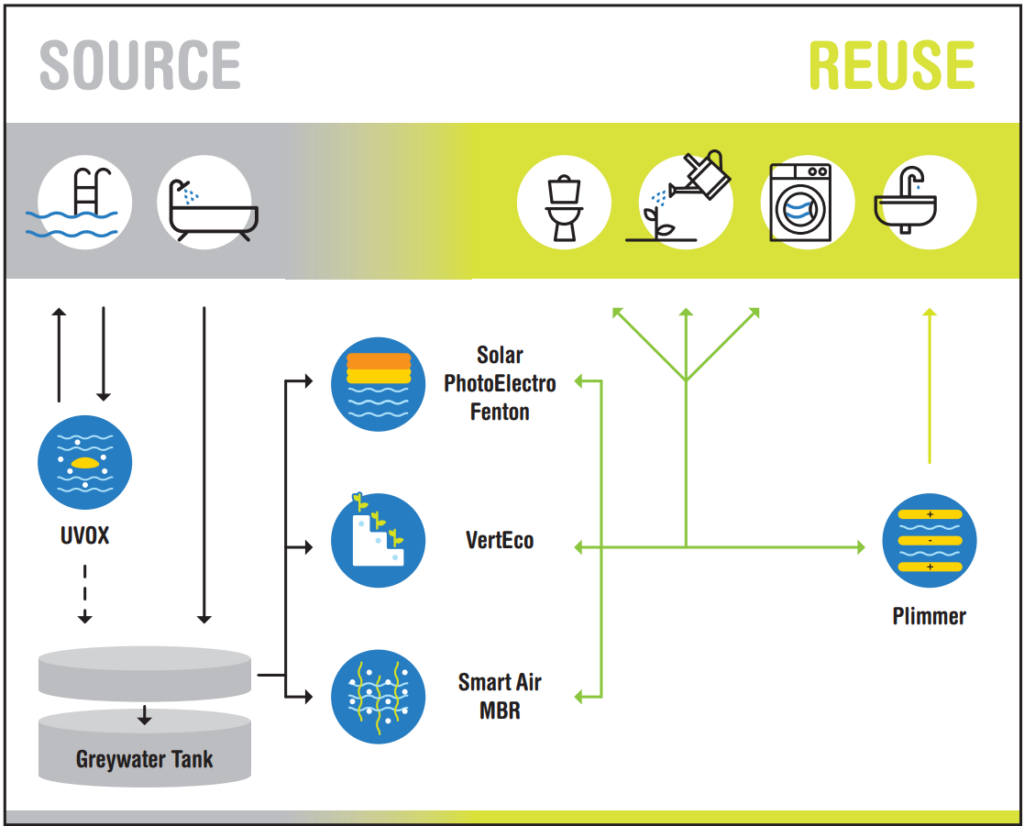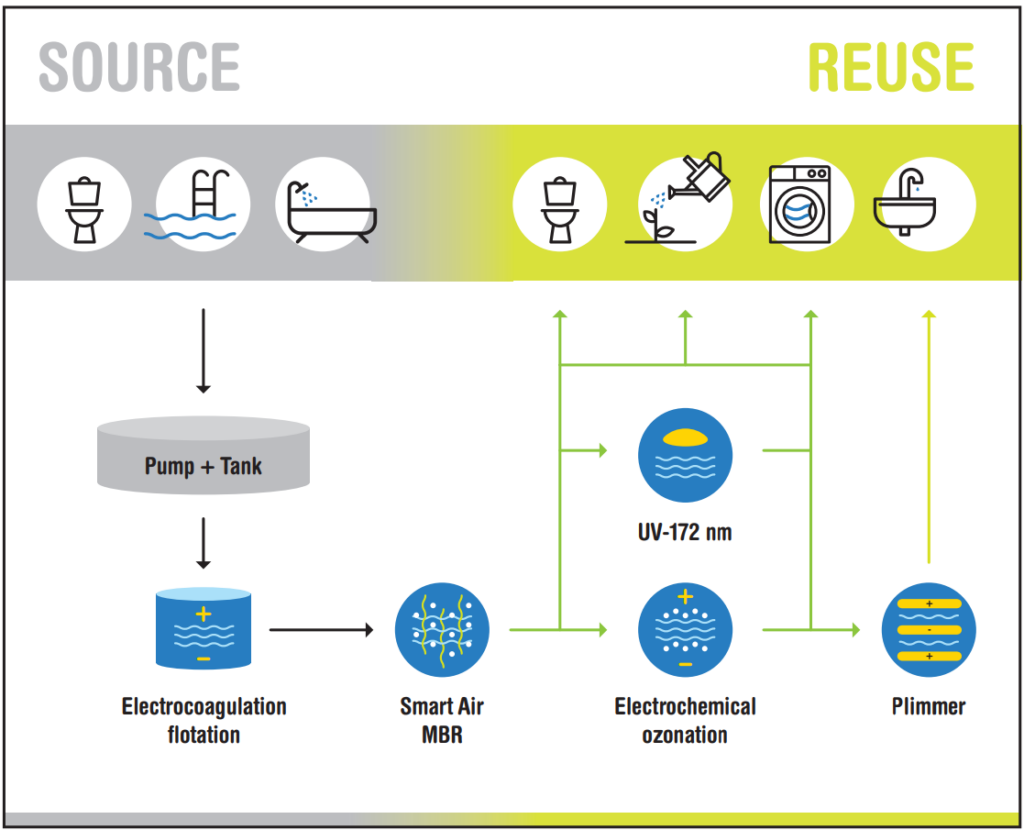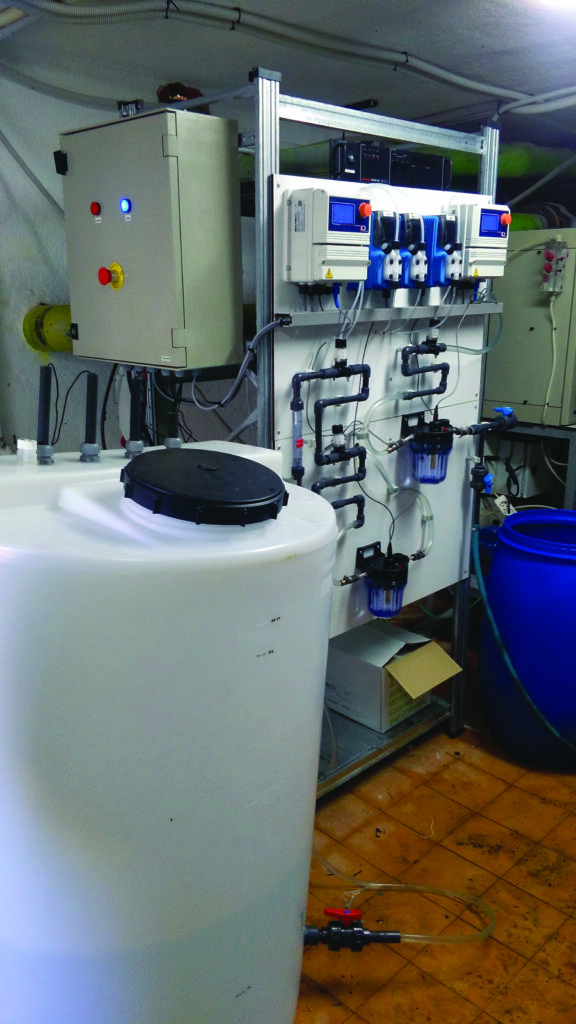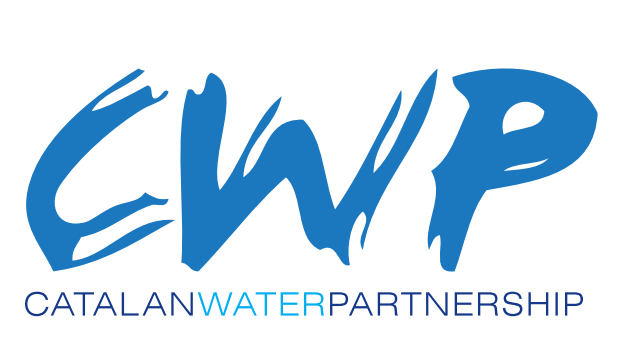Improving Water Management in Tourism Facilities
Coupled with growing water scarcity around the Mediterranean, high water and energy consumption is a major challenge for the sustainable development of the tourism industry and has become a limiting factor for economic growth at large. Highlights of demEAUmed – an EU-funded FP7 success story.
Tourist establishments use potable water for room services, as well as for the kitchen, the laundry, for irrigation, for the swimming pools or spas, and other services associated with water. For this reason, the possibility of optimizing the use of water without increasing the pressure on the client, but seeking alternative water resources (rainwater, sea water), and applying innovative technologies to treat the wastewater generated and enhance its reuse within the installation itself, is presented as the best alternative to boost the tourism sector and increase the sustainable economy of its management. The efficiency and practices in water management in the hotel sector are very little studied (Gabarda-Mallorqui et al 2017; Hadjikakouet, 2013, Rico-Amoros et al 2009). Specifically, there are hardly any indicators for daily consumption or occupied space depending on the hotel category, without taking into account many of the variables that could affect the hotel water cycle, such as measures of efficiency, type of treatments applied, etc.

The Catalan Water Partnership and its members are working to improve the water management and quality of tourism facilities, pointing out, as an example, the demEAUmed project with the participation of three CWP members (ICRA, LEITAT and ADASA) and the Hotel Samba located in Lloret de Mar outside Barcelona.
demEAUmed was been an EU-funded Seventh Framework Programme project from January 2014 to June 2017 involving seven countries: Austria, Belgium, France, Germany, Italy, Netherlands, and Spain. demEAUmed addressed two key challenges: the importance of the tourism economy and water scarcity in the Mediterranean area. demEAUmed has been a critical platform for promoting the use of sustainable and innovative technologies in other Euro-Mediterranean tourism facilities as a point of reference for the global tourism market.

The aim of demEAUmed was to involve industry representatives, stakeholders, policy-makers and diverse technical and scientific experts in demonstrating and promoting innovative technologies for an optimal and safe closed water cycle in Euro-Mediterranean tourism facilities, leading to their eventual market uptake. A representative resort (Hotel Samba) was considered as the demonstration site of the project, where a part of all inlet and outlet waters were treated with proper innovative technologies and reused to reduce the carbon footprint of water management in an integrated approach at demonstration level.
Water Cycle for Euro-Mediterranean resorts
First, an extensive survey was performed throughout Euro-Mediterranean resorts in order to pinpoint overall patterns and bottlenecks in existing water cycles, comparing the general Euro-Mediterranean baseline with the demo site in order to identify dissimilarities. In parallel, a representative part of all inlet and outlet waters of the demo site water cycle was identified.
Water quality requirements for reuse are not defined at the European level while RD 1620/2007 is the current legislation framework in the case of Spain. A broad overview of the presence of micro-pollutants, by use and by season, was performed as well. A set of quality parameters and threshold values/ranges established in RD 1620/2007 (or proposed by the demEAUmed consortium as state-of-the-art) as well as socio-economic or political parameters were fixed and updated throughout the project.
Water quality requirements for reuse are not defined at the European level.
Analyzing both historical data and values gathered during the project life, Hotel Samba’s higher water consumption was observed for its hotel rooms, kitchen, swimming pool and basement. Most of these uses are currently met in the hotel by means of drinking water, highlighting the necessity to foster water reuse in the demo site and in general in tourism installations.


The demo site water uses were organized in seven categories with decreasing water quality requirements: potable water used for human consumption, kitchens and showers/tubs; swimming pool; aquifer recharge through direct injection; irrigation of private gardens and toilet flushing; irrigation of golf courses; and aquifer recharge through localized percolation. A general roadmap taking into consideration demEAUmed’s innovative treatment technologies was developed to define the water streams and the technologies to be tested.
Innovative water treatment technologies
Three main water treatment lines (greywater, wastewater, swimming pool water) were defined, combining the eight available technologies for deploying realistic treatment combinations for each of them and analyzing the synergies and limitations for each case, with the final aim of closing the cycle. The accomplishment of successfully integrating these technologies, evaluating the synergies among them and their feasibility as combined treatments must be mentioned as a key achievement of the demEAUmed project.
Results obtained with SmartAir MBR, vertECO, SPEF in the greywater line were above expectations in output water quality and continuous operation robustness, also for micropollutants. Similarly, ECEF and SmartAir MBR worked in the wastewater line in a very stable and accurate way, and successfully coupled with electro-ozonation and 172nm UV technology. The integration of Plimmer technology provided a high cost-effective alternative for further treating greywater and wastewater streams. The swimming pool water treatment line accomplished a full validation of UVOX technology, confirming it to be a competitive solution.
Monitoring and Control System
The platform shows controls, generates alarms and records the information of the different water quantity and quality throughout the hotel, introducing the use of industrial data acquisition applications for water management in hotels and using Big Data strategies to improve efficiency and reduce the costs.
The tool applicability ranges from facilities that require efficient water management, as in the tourism sector, to other sectors such as urban use in small and remote communities or commercial buildings market, in specific water stressed areas as well as other sectors knowing, in real time, the different water flows, quality and helping in room/areas temperature, electrical consumption or machine information management.
Environmental assessment
The eight demEAUmed technologies and the seven combined strategies proposed were analyzed by means of life cycle assessment (LCA). The demEAUmed solution can result in important environmental impact savings. As a matter of fact, thanks to water reuse: the carbon footprint of demEAUmed combined strategies saved up to 136% (greywater scenario) and up to 62% (wastewater scenario). The main environmental impacts are found during the operation stage. The maintenance tasks and the use of cleaning agents have also important environmental impact contributions as well as the construction stage in case of large amounts of metals or materials implying complex manufacturing processes. Recommendations were provided to reduce the environmental impact contributions of demEAUmed technologies.
Additionally, an analysis of the current water quality and water reuse regulation at European, national and international levels was performed within the demEAUmed project, providing a public policy brief. The analysis concludes that existing barriers to reuse greywater and wastewater must be solved to reduce the environmental impact of current water consumption in Euro-Mediterranean areas.
Existing barriers to reuse greywater and wastewater must be solved to reduce the environmental impact of current water consumption in Euro-Mediterranean areas.
Decision Support System (DSS)
DSS was developed to integrate the information gathered throughout demEAUmed project regarding the hotel water cycle, technological performance and environmental and socio-economic assessment, providing user-friendly tools for decision-making processes regarding water reuse strategies in hotel resorts.

The tool allows the user to enter hotel characteristic data to set up the corresponding water matrix, choosing among water treatment technologies to analyze possible reuse strategies to be implemented. The user then obtains the estimated performance results for the specific strategy tested, including water qualities of the different components streams of the hotel water management network and the total amount of water saved.
A tailored design of the DSS architecture, the implementation of the water cycle model for simulating water flows and quality parameters, the integration of the different water reuse technology modules, and the integration of environmental, economic and social impacts was developed.
The main conclusions of the demEAUmed project demonstrated that the reduction of fresh water consumption in hotel installations, green and recreational areas can be achieved by using alternative water sources, such as the reuse of treated greywaters and/or wastewaters within a given resort. Several possibilities were considered for the resort as a whole, taking into account the specific quality/quantity requirements of water at the different areas of the demo site, as well as current/future compliance with water regulations. The incorporation of advanced monitoring and control systems, environmental and socio-economic assessment and a decision support tool supports in ultimately defining the best water management solutions.
The demEAUmed project represents the first demonstration project proving that water cycle management can address the water challenges of the tourism industry in the Mediterranean region. In the coming years, water scarcity episodes are expected to be more frequent, replicating the know-how gained during the demEAUmed project could prove a positive solution to advancing sustainable development for tourism at large.

The CATALAN WATER PARTNERSHIP (CWP) is the Catalan Cluster of the sustainable use of water, launched in 2008, as a non-profit strategic association business-oriented, formed by more than 65 entities that work in sector of the sustainable use of water, which mission is to improve the competitiveness of its members. The CWP promotes projects and multilevel collaborations, for developing innovative & sustainable solutions to the global water needs, in any part of the word.